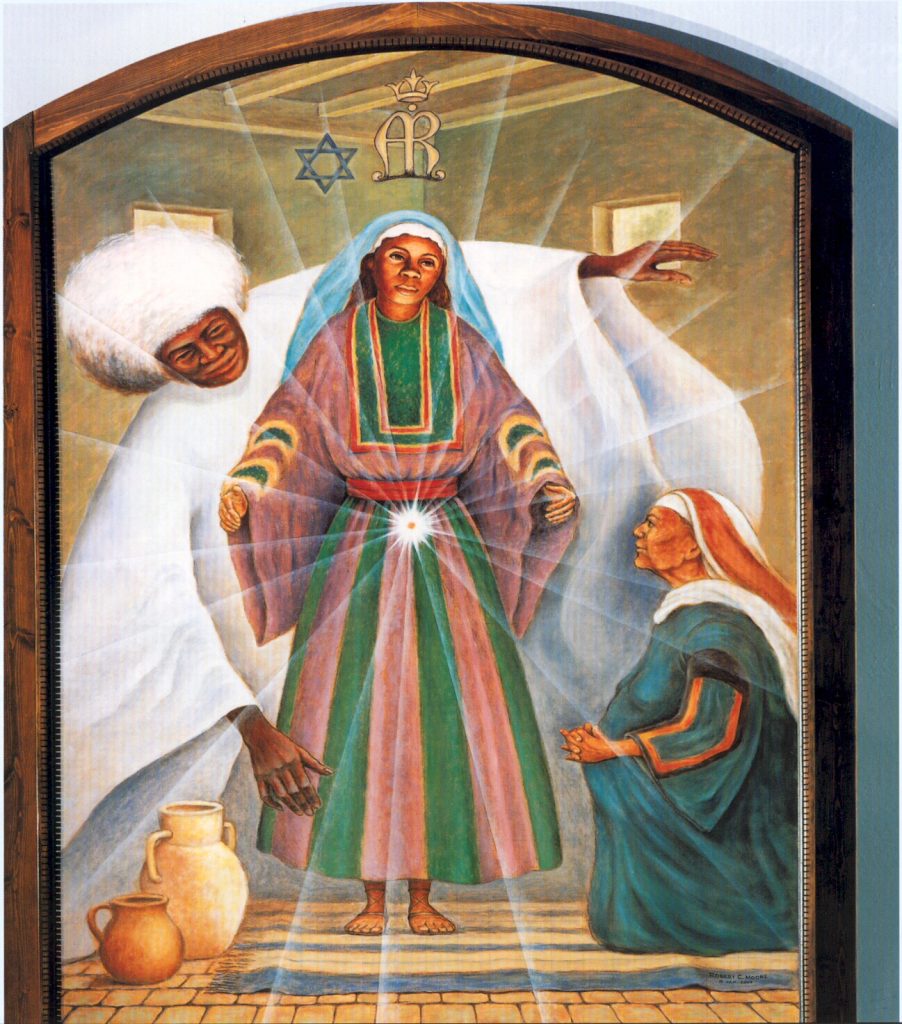You will conceive—in your womb—and you will give birth to a son…

Annunciation Tryptich by the late Robert Moore of the African Episcopal Church of St Thomas where it hangs in Philadelphia PA.
Did the Blessed Virgin say, “me too”? There is a moment in the Annunciation story when an ordinary girl on the cusp of womanhood is approached by a powerful male figure who tells her what is going to happen to her body, in its most intimate spaces. (#MeToo is a collection of women’s stories acknowledging their experiences of sexual assault and harassment following very public claims against a number of media executives.)
Sit with me in this moment, this uncomfortable moment, before rushing to find proof of her consent, or argue that contemporary notions of consent do not apply to ancient texts, or God knew she’d say yes so it was prophetic, or contend that (human) gender does not apply to divine beings, Gabriel or God, and the Holy Spirit is feminine anyway. Hold those thoughts and just sit in the moment with this young woman.
Even in the Iron Age in an androcentric and patriarchal culture, she knows her body belongs to her. She doesn’t ask what her intended will say, what her father will say, what about the shame this would likely bring on her, her family, and their name. Instead she testifies to the integrity of her body under her control. In her question, “How can this be?” I hear, “Since I have not done and will not do what you are suggesting—just in case you are really here to defraud me and my intended—how will this thing work.” I see her withholding consent at this moment. She has questions and has not agreed to this, glorious messianic prophecy notwithstanding. Not yet.
It is in this moment between “this is what you will do, what will happen to and in your body,” and submission to what she accepts as God’s will that I ask, Does Mary say, “me too”? Does she have a choice here? The narrative and world that produced it may well say no. That is what makes this a “me too” story to me.
Yet in a world which did not necessarily recognize her sole ownership of her body and did not understand our notions of consent and rape, this very young woman had the dignity, courage, and temerity to question a messenger of the Living God about what would happen to her body before giving her consent. That is important. That gets lost when we rush to her capitulation. Before Mary said, “yes,” she said, “wait a minute, explain this to me.”
After the holy messenger explains the mechanics of the conception that is to take place—he is still saying, “this will happen to you”—then and only then does she consent, using the problematic language of the text and her world, “Indeed, I am the woman-servant-slave of the Lord (a slaveholding title).” Mary’s submission is in the vernacular of slavery, as is much of the Gospel. The language of “servitude” is a misnomer in biblical translation; even though they were not necessarily enslaved in perpetuity, they were enslaved. And while enslaved had no right to protect the integrity of their bodies or control of their sexuality or reproduction. We often soften the language to “servant” particularly with reference to God but the language of slavery runs through the whole bible and is often found without critique on the lips of Jesus.
In this light, her consent is troubled and troubling: Let it be with me according to your word. Given what we know about power dynamics and hierarchy, (not to mention the needs of the narrative), how could she have said anything else? I think that there is not much difference between “overshadowed” and “overwhelmed.” I also remember Jeremiah saying God had *seduced and **overpowered him. (*Translated “enticed” in Jer 20:7, פתה means “seduced” in Ex 22:16; Deut 11:16; Judg 14:15. **The second verb חזק, is one of two primary terms for rape in the Hebrew Bible.)
Did the Ever-Blessed Virgin Mary say, “me too?” Perhaps not. A close reading shows her presumably powerless in every way but sufficiently empowered to talk back to the emissary of God, determine for herself, and grant what consent she could no matter the power of the One asking. And yet in that moment after being told by someone else what would happen to her body, she became not just the Mother of God, but the holy sister to those of us who do say, “Me too.”

Rev. Dr.Suzanne Kershaw
November 27, 2017 7:17 amDr. Gafney, thank you for sharing and guiding me through the deeper thoughts of the text and providing for me a new point of reflection through the words “holy sister” . Rev. Dr. Suzanne Kershaw, Associate Minister, Grace Baptist Church of Germantown
Wil
November 27, 2017 10:25 amThank you and good to hear from you.